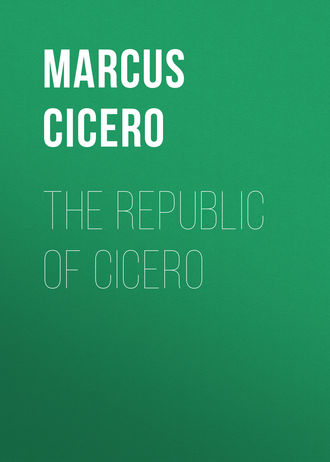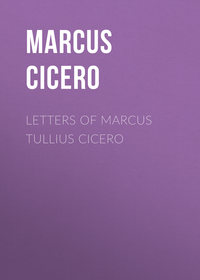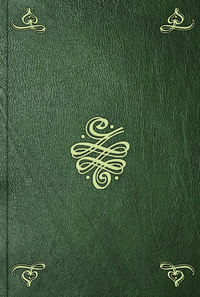 полная версия
полная версияThe republic of Cicero
IV. * * * * At the expiration of my consulship, when in the assembly of the Roman people, I swore that the republic had been saved by my exertions, which they confirmed by universal acclamation, I was requited for the cares and vexations of every injury. Albeit my reverses had more honour than pain attached to them, and less disquietude than glory. Greater was my pleasure at receiving the approbation of good men, than my regret at observing the satisfaction of the bad. But had it happened otherwise, as I said, what complaint could I make? Nothing unforeseen could have occurred, nor more grievous than I might have expected for so many of my deeds. For I was one who could well have gathered greater fruits from ease than others, on account of the agreeable variety of the studies I had pursued from my childhood; and if any disaster had overtaken the republic, I need not have sustained a greater share of it, but have divided it equally with the rest. I hesitated not to oppose myself to those stormy tempests, and almost raging waves, for the sake of preserving my fellow citizens, and of accomplishing at my own risk the common safety of all. For our country has not produced us, or educated us under a law, that she is entitled to no support on our part, lending herself as it were to our convenience only; furnishing a secure refuge, and a tranquil and peaceful asylum to our indolence: but rather holds as pledges to her, to be employed for her benefit, the many and great faculties of our mind, genius, and reason; and only permits us to appropriate to our private purposes, that portion of them, of which she stands in no need.
V. The pretences which are urged for the enjoyment of indolence are not to be listened to. As when it is stated that the public affairs are meddled with by men worthy of no confidence, with whom it is disgraceful to associate: yet to contend against whom is a miserable and dangerous effort, especially when the multitude is excited. For which reason a prudent man ought not to take the reins, when he is not able to restrain the mad and untameable violence of the vulgar: or a generous man expose himself to the lashes of contumely in a strife with low and outrageous adversaries: or a wise man hope to withdraw from such a contest without injury. As if there could well be a more just cause for good and firm men, endowed with noble minds, to stand forth in aid of their country, than that they may not be subject to bad men; nor suffer the republic to be lacerated by them, before the desire of saving it may come too late.
VI. But who can approve of their exception, that a wise man ought not to take upon him any part of the public affairs, unless an occasion of extraordinary need should drive him to it? as if indeed a greater necessity could ever have happened to any one, than occurred to myself. How could I have been useful then, had I not been consul? and how could I have been consul, had I not pursued that course of life from my youth, which belonging to the equestrian rank, in which I was born, enabled me to attain the first honours of the state? No man therefore can assume at pleasure the ability of aiding in the public service, however urgent the danger may be, unless he stands in that relation to his country, which fits him for the occasion. And it appears to me most marvellous, that in the discourse of learned men, they who declare themselves unable to steer in a calm sea, because they have never been taught, nor have ever studied the subject, talk of taking the helm in the midst of the greatest storms. For these very men openly declare, and pride themselves greatly upon it, that they have never studied or taught the mode of establishing or protecting the public interest; which they think the exclusive province, not of learned and erudite men, but of those who are practised in these matters. What consistency is there then in promising to aid the republic in times of peril, when they are incapable of the easier task of directing it in the calmest moments? And although, in truth, the philosopher is not wont of his own accord, to consider the details of state affairs, unless called upon by the times to do it, when indeed he will not decline what duty imposes on him; nevertheless, I judge the knowledge of state affairs is least to be neglected by a wise man; that every thing may be familiar to him, for he cannot tell the moment, when it may be necessary for him to avail himself of his knowledge.
VII. These things I have somewhat enlarged upon, because the discussion proposed and undertaken by me in this work, was on government: and in order to prevent its being without effect, it was necessary in the first instance, to remove every doubt as to the duty of engaging in the public service. Nevertheless if there are any who are governed by the opinions of philosophers, let them turn their attention for a while, and listen to those who enjoy a proud pre-eminence among learned men, even when they have not borne any charge in the republic; still whom I deem from the extent of their studies, and their writings on government, to have been invested with functions appertaining to the public interest. But those seven, whom the Greeks call wise, I perceive have almost all been greatly engaged in public affairs. For there is no one thing in which human worth is more nearly allied to the power of the gods, than to found new states, or to preserve those already founded.
VIII. Concerning which matters, since it hath happened to me, to be deemed something worthy of memory in my administration of public affairs, and to possess some talent for unfolding them; not only in practice, but being versed too in the art of speaking and teaching: while of those before me, some were perfect in debate, yet unknown by their deeds; others of respectable parts for business, without the talent of oratory. Still it is not my intention here to bring forward any new system invented by myself, but to repeat a discussion, that took place at a certain period of our history, among our most illustrious and wise men, which was related to me a long time ago in my youth, by P. Rutilius Rufus, when we were at Smyrna together: in the which I think scarce any point was omitted that belongs to the consideration of these great matters.
IX. When P. Africanus, the son of Paulus, established Latin holidays in his gardens, during the consulate of Tuditanus, and Aquilius; and his most intimate friends had promised to visit him frequently at that season. On the morning of the first day, Q. Tubero, the eldest son of his sister, came. Pleased with his visit, and kindly addressing him “What! Tubero,” said he, “is it you so early? I should have thought these holidays would have given you a favourable opportunity of pursuing your literary inquiries.” “Why in truth,” replied he, “I can apply all my leisure to my books, for they are always disengaged. But to find you at leisure, is very remarkable; especially at this time so critical for the republic.” “So help me Hercules,” said Scipio, “however you find me, it is more idle in appearance than in truth.” “You must now,” said Tubero, “relax your mind a little also, for several of us have determined if it is not inconvenient to you, to spend some of our leisure with you.” “With all my heart,” replied Scipio, “provided we may acquire some information thereby on philosophical subjects.”
X. “Since you invite and encourage me to it yourself,” said Tubero, “let us first converse, Africanus, before the others come, about the meaning of this double sun which has been spoken of in the senate. For those who declare that they have seen two suns, are neither few in number, nor insignificant persons: so that it appears to be of less importance to doubt the fact, than to inquire into the cause of it.” “Would that we had with us our excellent Panætius,” said Scipio, “who among other objects of knowledge, was so diligent an inquirer about celestial phenomena. As to myself, Tubero—for to you I will freely declare what I think; I am not drawn in to adopt in matters of this sort, the opinions of our friend, who pronounces things which are scarcely within the reach of conjecture, to be as manifest, as if he beheld them with his eyes, or could lay his hands upon them. On which account I am accustomed to consider Socrates much wiser, who leaves the consideration of such things aside, and teaches that the phenomena about which nature may be interrogated, are either beyond the force of human reason, or irrelevant to the conduct of human affairs.” “I know not,” rejoined Tubero, “what authority there is for the fact, that Socrates rejected all discussion upon such matters, and confined himself to the moral conduct of human life. For what author is to be commended, as more ample on that head than Plato; in whose writings, in many places, it is the custom of Socrates in discussing morals, the virtues, and finally public affairs; to allude studiously to the science of numbers, to geometry, and to harmony, after the Pythagorean mode.” Scipio answered, “these things are as you say; but I dare say you have heard, Tubero, that Plato after the death of Socrates, was carried by the love of knowledge first into Egypt, afterwards into Italy and Sicily, that he might obtain an insight into the discoveries of Pythagoras. That he associated much with Archytas the Tarentine, and with Timæus of Locram. That he acquired the commentaries of Philolaus, and perceiving that the name of Pythagoras was at that time in great reputation in those places, he dedicated his time to the disciples of Pythagoras and to their opinions. But as he had loved Socrates alone, and wished to make all things conducive to his reputation, he interwove very skilfully the subtlety and humour of the Socratic style with the mysteries of Pythagoras, and with many branches of the arts.”
As Scipio ceased to speak, he suddenly saw L. Furius approaching, and as soon as he had kindly saluted him, he took him by the hand, and placed him on his couch. And as P. Rutilius the accomplished preserver of this conversation appeared at the same time, saluting him also in the same manner, he bade him be seated near to Tubero. “What are you engaged in,” said Furius; “hath our arrival broken in upon your conversation?” “Not in the least,” replied Africanus, “for it is precisely about matters, such as Tubero has just been introducing, that thou art wont diligently to inquire into, and to investigate. And indeed our friend Rutilius was in the habit occasionally of discussing things of this kind with me, when we were under the walls of Numantia.” “What is the subject you have fallen upon?” said Philus. “These two suns,” replied he, “respecting which I am desirous of hearing your opinion.”
XII. As he spoke this, a boy announced that Lælius was approaching, having already left his house; upon which Scipio having dressed himself, left his chamber, and had made but a few paces in the portico, when he saluted Lælius who was approaching, and those who were with him: Spurius Mummius, to whom he was particularly attached; Fannius, and Quintus Scævola, sons-in-law of Lælius, highly gifted young men of the quæstorial age. And having welcomed them all, he made another turn on the portico, placing Lælius in the middle; for in their friendship it was a sort of law between them, that Lælius did homage to Scipio as to a god, on account of his glorious pre-eminence in war; while in his turn Scipio, in private life, paid to Lælius all the reverence due to a parent, on account of his superior years. And having chatted a little together in various places, Scipio, who was very much enlivened and gratified with their arrival, was pleased to have them seated in a sunny place in a little meadow, on account of its being the winter season; which as they were about to do, M. Manilius came, a prudent and agreeable person, and very dear to them all; who being cordially saluted by Scipio and the rest, took his seat next to Lælius.
XIII. “It does not seem to me necessary,” said Philus “that we should seek another subject of conversation on account of those who are arrived, but that we should observe more accuracy, and say something worthy of their ears.” “What subject were you upon,” said Lælius, “and what discussion are we come to be present at?” “Scipio was inquiring of me,” replied Philus, “what my opinion was respecting the fact of two suns having been seen.”
Lælius. “Why truly Philus, is there no longer any thing left for us to inquire about, touching our own domestic affairs, or those appertaining to the republic, that we must be exploring the things that are passing in the heavens?” “Dost thou then think,” replied he, “that it does not concern our own mansions, to know what is passing, and what is done in that vast one, not the one surrounded by our walls, but that which constitutes the universe, and which the gods have given to us for a domicile, and a common country with themselves. Especially when if we are ignorant of them, many and very high matters will be hidden from us. As to myself, the contemplation and knowledge of these things delight me, as certainly as it does you, Lælius, and all who are eager in the pursuit of knowledge.” “I offer no impediment,” said Lælius, especially at this holiday time; but shall we hear any thing, or are we come too late?”
Philus. “Nothing has been discussed yet, and as the subject is entire, I freely concede to you, Lælius, the right of expressing your sentiments first.”
Lælius. “Let us rather hear you, unless Manilius thinks, that some decree by way of compromise between these two suns may be adjusted; so that each may keep possession of its own part of the firmament.” “You love still to banter that science, Lælius, in which I am proud to excel,” replied Manilius, “and without which no one could know his own possession from anothers. But of that by and by. Let us now listen to Philus, who I perceive has a case of greater difficulty referred to him, than ever came before me or P. Mucius.”
XIV. “I shall lay nothing new before you,” said Philus, “nor any thing discovered or thought of by myself. I remember, however, that C. Sulpicius Gallus, a very learned man as you know; when this same phenomenon was stated to have been seen, being by chance in the house of M. Marcellus, who had been in the consulate with him; ordered a sphere to be placed before him, which the ancestor of M. Marcellus had taken from the conquered Syracusans, and brought out of their wealthy and embellished city; the only thing he had possessed himself of among so great a spoil. I had heard a great deal of this sphere, on account of the fame of Archimedes, but did not admire the construction of it so much; for another which Archimedes also had made, and which the same Marcellus had placed in the temple of virtue, was more elegant and remarkable in the general opinion. But subsequently, when Gallus began very scientifically to explain the nature of the mechanism; the Sicilian appeared to me to possess more genius, than human nature would seem to be capable of. Gallus said, that the other solid and full sphere was an old invention, and was first wrought by Thales of Miletas: but afterwards was delineated over with the fixed stars in the heavens by Eudoxus, the Cnidian, a disciple of Plato. The which adorned and embellished as it was by Eudoxus, Aratus who had no knowledge of astronomy, but a certain poetical faculty, many years afterwards extolled in his verses. The mechanism of this sphere, however, on which the motions of the sun, moon, and those five stars which are called wandering and irregular, are shown; could not be illustrated on that solid sphere. But what appeared very admirable in this invention of Archimedes was, that he had discovered a method of producing the unequal and various courses, with their dissimilar velocities, by one revolution. When Gallus put this sphere in motion, the moon was made to succeed the sun by as many revolutions of the brass circle, as it actually took days to do in the heavens. From which the same setting of the sun was produced on the sphere as in the heavens: and the moon fell on the very point, where it met the shadow of the earth, when the sun from the region * * * *
[About ten pages wanting.]XV. * * * * * for he was a man I was very much attached to, and I know that my father Paulus esteemed and placed the highest value on him. I remember when I was but a boy, being with my father, who was then consul in Macedonia; that while we were encamped, our army was struck with a religious dread, because the full and splendid moon in the serenity of the night, was suddenly eclipsed. He being then our lieutenant, the year just before that in which he was declared consul, did not hesitate the following day, to pronounce openly in the camp, that it was no prodigy. And that what had then taken place, would always occur in future at those particular periods, when the position of the sun was such, that its rays could not fall upon the moon. “But how could he,” asked Tubero, “make men half wild, comprehend such matters, or venture to speak of them before the unenlightened?”
Scipio. “Indeed he did, and with great * * * *
[About two pages wanting.]* * * * * there was neither a haughty ostentation, nor any thing in his speech unbecoming a grave personage; and he accomplished a point of great importance, in removing from the disturbed minds of the men, the influence of an idle and fearful superstition.
XVI. There was an occurrence similar to this during the great war, which the Athenians and Lacedemonians waged against each other with so much inveteracy. Darkness being suddenly produced by the obscuration of the sun, and a prodigious fear taking possession of the minds of the Athenians. Pericles, the first man in the city, in authority, in eloquence, and in council; taught the citizens what he had himself learnt from Anaxagoras, whose pupil he had been: that it was an unavoidable appearance at the particular period, when the moon had placed herself immediately before the orb of the sun: and although it did not take place every lunar period; it could nevertheless be occasioned only by the moon’s motion. Having convinced them by reasoning, he delivered the people from their apprehension. For it was then a strange and unknown reason to give for an eclipse, that the sun and moon were in opposition to each other, which it is said, was first observed by Thales the Milesian. At a later period, this had not escaped our Ennius, who wrote about the year 350 of the building of Rome, in the nones of June; that “the moon and night stood before the sun.” So great, however, is the advancement of knowledge in these matters, that from this day, which we find noted in the principal annals, and by Ennius; the previous occultations of the sun are fixed up to that which took place in the reign of Romulus, in the nones of the fifth month. During which darkness, Romulus, whom the laws of nature indeed would have carried to the tomb, is said to have been borne by his virtue to heaven.
XVII. Then Tubero, “Dost thou not perceive Africanus, that what appeared otherwise to thee a while ago * * * * * *
[About two pages wanting.]* * * * * * “Who can perceive any grandeur in human affairs, whose eyes are accustomed to survey the empire of the gods? What are temporal things in the eyes of those conversant with eternal ones? What is there glorious to the contemplation of him, who looks at the small size of the earth; first as to its whole extent, then to that part of it which men inhabit? And yet we, confined to so small a portion of it, unknown to most nations, hope our name will be diffused to its utmost limits. What are lands, and houses, and flocks, and immense masses of gold and silver to him who neither considers them desirable nor calls them so: the fruition of which appears to him trifling, the use unsatisfactory, the possession uncertain: and which are often in the hands of the most contemptible of men? How fortunate may that man be esteemed, who alone claims a share in all things, not as the privilege of a citizen, but of a philosopher: not by civil rights, but by the common law of nature, which forbids any one to be the proprietor of aught, of the proper use of which he is ignorant! Who considers our consulships and high offices, not to be sought after for the sake of personal advantage or glory; not as things to be coveted, but to be undertaken as duties. The man finally who can say that of himself which my ancestor Africanus, as Cato writes, was wont to say, “that he never was more busy than when he was doing nothing; and that he never was less alone, than when nobody was with him.”
For who can deem Dionysius to have accomplished a greater thing, when by the greatest exertion he snatched their liberties from the citizens, than Archimedes his countryman, who appearing to be occupied in nothing, produced this sphere of which we were but now conversing? Are they not more alone, who find no one in the forum or in the crowd who chooses to talk with them, than those who without any witness can converse with themselves; or as it were, be present at the councils of the most learned men, when they solace themselves with their discoveries and writings? Who in truth can imagine any one to be more rich, than the man who has no wants, beyond the simple calls of nature; or more powerful than him, who has attained the possession of al that he desires; or more blessed than him who is freed from all anxiety of mind? or what man’s fortune is better established than his, who can carry along with him, or out of a shipwreck as men are wont to say, all his possessions? What command, what office, what kingdom can be preferred to that condition of mind, which looking down upon all things human, and esteeming them to be the objects of an inferior wisdom, turns ever to the contemplation of those things that are divine and eternal: persuaded that they only deserve to be called men, who are refined by the sciences of humanity? That which has been said of Plato, or of some other sage, appears to me therefore very excellent. Who being borne by a tempest to unknown lands, and cast on a desert shore, while his companions were apprehensive on account of their ignorance of the place, is said to have perceived geometrical figures described on the sand. Which when he saw, he bade them all be of good heart, for he had seen vestiges of men. Not that he judged so from the cultivation of the fields which he beheld, but from these indications of science. For all these reasons, Tubero, learning, and learned men, and these thy studies have always been pleasing to me.
XVIII. Then said Lælius, “I am not bold enough, Scipio, to speak of these things: nor even to thee, or Philus, or Manilius * * * * *
[Two pages wanting]* * * * in his paternal house we have had a friend, worthy to be imitated by him.
“Ælius Sextus, conspicuously discreet and wise.” That he was conspicuously discreet and wise, is said by Ennius, not because he sought after what he was not able to discover, but because he answered those who made inquiries of him, in a manner to solve their difficulties and anxieties, in whose mouth when arguing against the studies of Gallus, were always these words of Achilles, in Iphigenia.
“Astrology, its signs; how are they read in heaven?When goat or scorpion, or ferocious names arise,The obvious earth is shunned, to scrutinize the skies.”He also said, for many times and willingly I listened to him, that Zethus the author of Pacuvius, was too great an enemy to science. The Neoptolemus of Ennius pleased him more; who says that he likes to philosophize but only with a few; not willing to give himself up to it altogether. But if the studies of the Greeks delight you so much, there are others freer and more easily diffused, which we may bring to the use of life, or even to that of the republic. As for these arts, their value consists, if in any thing, in stimulating and sharpening the genius of young boys; enabling them in this manner the better to comprehend greater things.
XIX. “I do not dissent from you, Lælius,” said Tubero, “but ask what you understand by greater things?”
Lælius. “I will tell you in good faith, although you may somewhat despise me for it; since it is you who are asking Scipio about these celestial matters. As for myself, I think those things most worthy of our attention, which lay immediately before our eyes. How can it interest me that the grandson of L. Paulus by the mother’s side, born of such a noble and illustrious family in this republic, should seek for reasons why two suns have been seen, when he does not inquire the cause why two senates, and almost two people exist in one republic? For as you perceive the death of Tiberius Gracchus, and even before that event, the whole proceedings of his tribunate were dividing one people into two parties: those who are the detractors of Scipio also, and are envious of him, urged on at first by P. Crassus and Appius Claudius, keep up notwithstanding their death, an opposition to us in the senate, through the influence of Metellus and P. Mucius. Nor will they suffer him to come forward, who is alone equal to so dangerous a crisis, amidst the factious and dangerous associations made under the Roman name: amidst violated compacts, and the new matters daily stirring by the seditious triumvirs, to the consternation of good and respectable men. Wherefore young men, if you will listen to me, entertain no apprehensions about this double sun: for either it is nothing at all, or if it is a reality, as far as it has been observed, there is nothing injurious in it. Either we can know nothing about such matters, or even if we could know all about them, we should not be better or happier for that knowledge. But one senate and one people we may have; that is practicable. And if it is not done, we shall suffer for it. And we know it is otherwise, and that if it were effected, we should have more stability, and be happier and better.”











